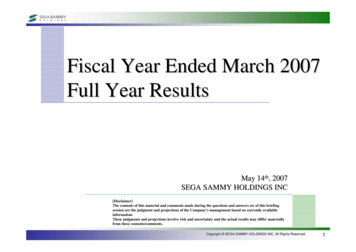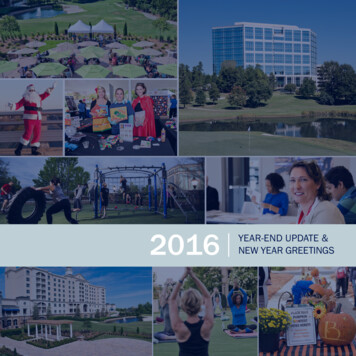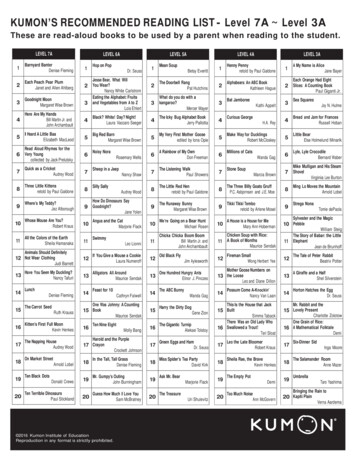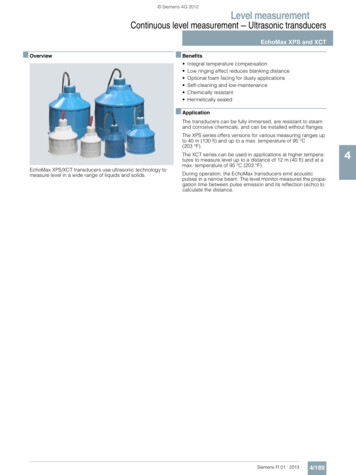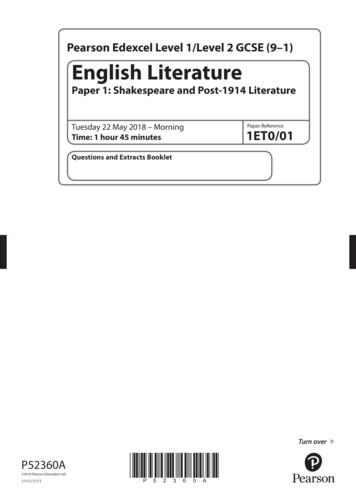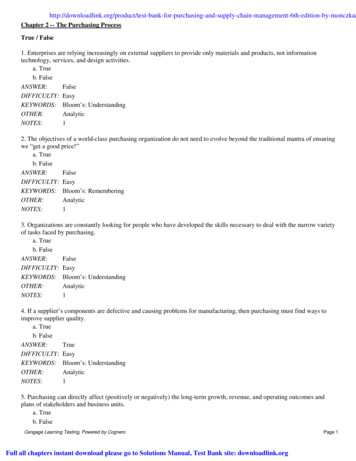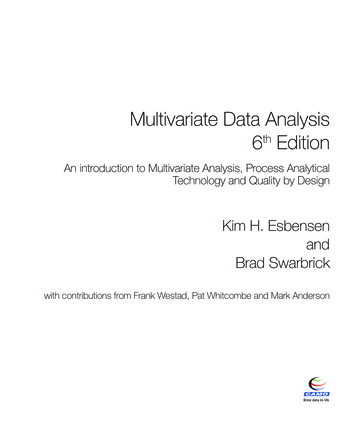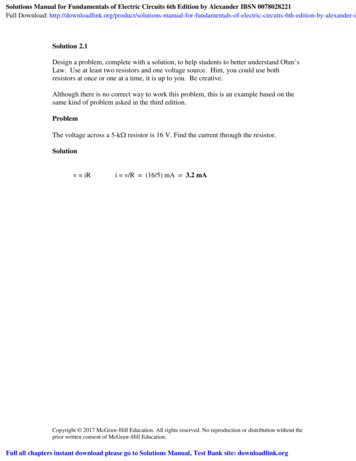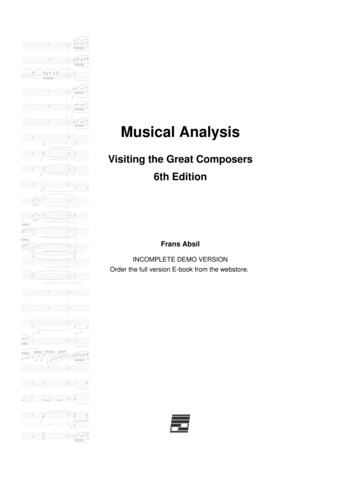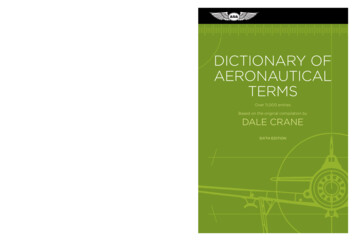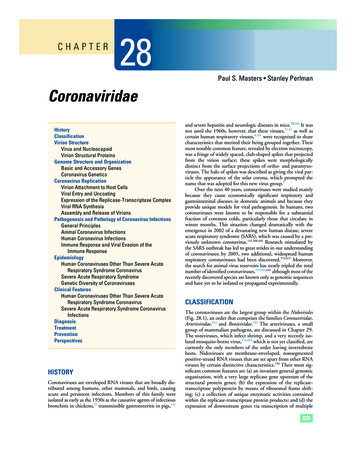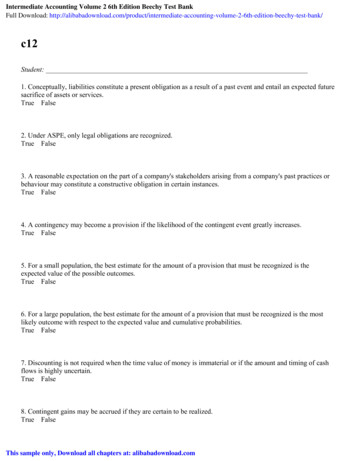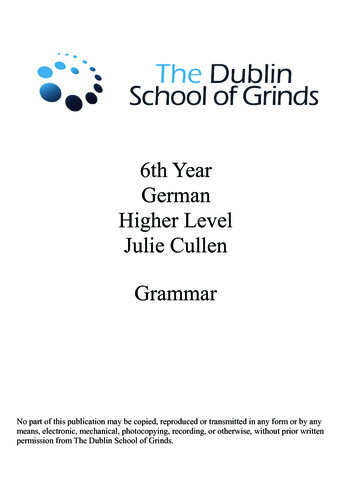
Transcription
6th YearGermanHigher LevelJulie CullenGrammarNo part of this publication may be copied, reproduced or transmitted in any form or by anymeans, electronic, mechanical, photocopying, recording, or otherwise, without prior writtenpermission from The Dublin School of Grinds.
EASTERREVISIONCOURSESLooking to maximiseyour CAO points?Easter is a crucial time for students to vastly improveon the points that they received in their mock exams.To help students take advantage of this valuable time,The Dublin School of Grinds is running intensive, examfocused Easter Revision Courses. Each course runs forfive days (90 minutes per day). All courses take place inStillorgan, Co. Dublin.The focus of these courses is to maximise students’CAO points.EASTER REVISION COURSE FEES:6TH YEAR & 5TH YEAR COURSESPRICETOTALSAVINGS1st Course 295 295-2nd Course 180 475 1153rd CourseFREE 475 4104th Course 70 545 6355th Course 100 645 8306th Course 100 745 1,0257th Course 100 845 1,2208th Course 50 895 1,4659th Course 50 945 1,7103RD YEAR COURSESPRICETOTALSAVINGSSPECIAL OFFER1st Course 195 195-2nd Course 100 295 95To avail of this offer, early booking is requiredas courses were fully booked last year.3rd CourseFREE 295 2904th Course 85 380 4005th Course 50 430 5456th Course 50 480 6907th Course 50 530 8358th Course 50 580 980BUY 2 COURSES GET A 3RDCOURSE FREEWhat do students get at thesecourses?99 90 minutes of intensive tuition per day for fivedays, with Ireland’s leading teachers.99 Comprehensive study notes.99 A focus on simple shortcuts to raise students’grades and exploit the critically importantmarking scheme.99 Access to a free supervised study room.NOTE: These courses are built on the fact that thereare certain predicable trends that reappear over andover again in the State Examinations.DSOG Easter 2017 8pg A4 FINAL PRINT.indd 225% SIBLING DISCOUNT AVAILABLE.Please call 01 442 4442 to avail of this discount.FREE DAILY BUS SERVICEFor full information on our Easter bus service, see 3 pages ahead.Access to food and beverage facilities is also available tostudents.To book, call us on 01 442 4442 or bookonline at www.dublinschoolofgrinds.ie20/02/2017 13:25
TimetableAn extensive range of course options areavailable over a two-week period to cater forstudents’ timetable needs. Courses are held overthe following weeks:»» Monday 10th – Friday 14th April 2017»» Monday 17th – Friday 21st April 2017All Easter Revision Courses take place in The Talbot Hotel, Stillorgan(formerly known as The Stillorgan Park Hotel).6th Year Easter Revision CoursesDATES5th Year Easter Revision ay 10th - Friday 14th April12:00pm - 1:30pmDATESTIMEEnglishHMonday 10th - Friday 14th April12:00pm - 1:30pmAgricultural ScienceHMonday 10th - Friday 14th April10:00am - 11:30amMathsHMonday 10th - Friday 14th April10:00am - 11:30amApplied MathsHMonday 10th - Friday 14th April8:00am - 9:30amArt HistoryHMonday 10th - Friday 14th April2:00pm - 3:30pmNote: 4th Year students are welcome to attend any of the 5th Year courseslisted above.Biology Course A*HMonday 10th - Friday 14th April8:00am - 9:30amBiology Course A*HMonday 17th - Friday 21st April10:00am - 11:30amBiology Course B*HMonday 10th - Friday 14th April10:00am - 11:30amBiology Course B*HMonday 17th - Friday 21st AprilBusinessHMonday 10th - Friday 14th AprilBusinessHMonday 17th - Friday 21st AprilChemistry Course A*HChemistry Course B*3rd Year Easter Revision CoursesSUBJECTLEVEL8:00am - 9:30amBusinessStudiesHMonday 17th - Friday 21st April2:00pm - 3:30pm12:00pm - 1:30pmEnglishHMonday 10th - Friday 14th April10:00am - 11:30am8:00am - 9:30amEnglishHMonday 17th - Friday 21st April12:00pm - 1:30pmMonday 17th - Friday 21st April8:00am - 9:30amFrenchHMonday 17th - Friday 21st April12:00pm - 1:30pmHMonday 17th - Friday 21st April10:00am - 11:30amGeographyHMonday 17th - Friday 21st April8:00am - 9:30amClassical StudiesHMonday 10th - Friday 14th April2:00pm - 3:30pmGermanHMonday 17th - Friday 21st April2:00pm - 3:30pmEconomicsHMonday 10th - Friday 14th April8:00am - 9:30amHistoryHMonday 10th - Friday 14th April8:00am - 9:30amEconomicsHMonday 17th - Friday 21st April10:00am - 11:30amIrishHMonday 10th - Friday 14th April12:00pm - 1:30pmEnglish Paper 1*HMonday 17th - Friday 21st April8:00am - 9:30amMathsHMonday 10th - Friday 14th April8:00am - 9:30amEnglish Paper 2*HMonday 10th - Friday 14th April8:00am - 9:30amMathsHMonday 17th - Friday 21st April10:00am - 11:30amEnglish Paper 2*HMonday 17th - Friday 21st April10:00am - 11:30amMathsOMonday 10th - Friday 14th April2:00pm - 3:30pmFrenchHMonday 10th - Friday 14th April10:00am - 11:30amScienceHMonday 10th - Friday 14th April12:00pm - 1:30pmFrenchHMonday 17th - Friday 21st April8:00am - 9:30amScienceHMonday 17th - Friday 21st April8:00am - 9:30amGeographyHMonday 10th - Friday 14th April8:00am - 9:30amSpanishHMonday 10th - Friday 14th April2:00pm - 3:30pmGeographyHMonday 10th - Friday 14th April2:00pm - 3:30pmGermanHMonday 17th - Friday 21st April12:00pm - 1:30pmNote: 2nd Year students are welcome to attend any of the 3rd Year coursesabove.History (Europe)*HMonday 17th - Friday 21st April2:00pm - 3:30pmHistory (Ireland)*HMonday 17th - Friday 21st April12:00pm - 1:30pmHome EconomicsHMonday 10th - Friday 14th April12:00pm - 1:30pmIrishHMonday 10th - Friday 14th April10:00am - 11:30amIrishHMonday 17th - Friday 21st April12:00pm - 1:30pmMaths Paper 1*HMonday 10th - Friday 14th April8:00am - 9:30amMaths Paper 1*HMonday 10th - Friday 14th April12:00pm - 1:30pmMaths Paper 1*HMonday 17th - Friday 21st April8:00am - 9:30amMaths Paper 2*HMonday 10th - Friday 14th April10:00am - 11:30amSUBJECTMaths Paper 2*HMonday 17th - Friday 21st April10:00am - 11:30amFrenchHSunday 12th March9:00am - 1:00pmMaths Paper 2*HMonday 17th - Friday 21st April12:00pm - 1:30pmGermanHSaturday 11th March9:00am - 1:00pmMathsOMonday 10th - Friday 14th April10:00am - 11:30amIrishHSunday 19th March9:00am - 1:00pmMathsOMonday 17th - Friday 21st April12:00pm - 1:30pmSpanishHSaturday 11th March2:00pm - 6:00pmPhysicsHMonday 17th - Friday 21st April10:00am - 11:30amSpanishHMonday 10th - Friday 14th April12:00pm - 1:30pmSpanishHMonday 17th - Friday 21st April10:00am - 11:30amNote: 5th Year students are welcome to attend any of the 6th Year coursesabove.* Due to large course content, these subjects havebeen divided into two courses. For a full list of topicscovered in these courses, please see 3 pages ahead.To book, call us on 01 442 4442 or bookonline at www.dublinschoolofgrinds.ieDSOG Easter 2017 8pg A4 FINAL PRINT.indd 3DATESTIME6th Year Oral Preparation CoursesWith the Oral marking component worth up to 40%, it is of paramountimportance that students are fully prepared for these examinations. Thesecourses will show students how to lead the Examiner towards topics theyare prepared for. This will equip students with the information they need tomaximise their performance in the State Examinations.FEES: 140VENUE: The Talbot Hotel, Stillorgan (formerly The Stillorgan Park Hotel)LEVELDATESTIMEBUY 2 COURSES &GET A 3RD COURSEFREE!20/02/2017 13:25
THE GRAMMAR The Dublin School of Grinds55Ms Julie Cullen
It is important that you understand what these words mean in both English and German. Thelanguage that you speak everyday has come naturally to you. Although a parent may correctyour grammar “I have done, NOT I done!”, they don’t usually shout “That’s not the correct pastparticiple! You used your modal verb incorrectly!” In German, we’re expected to know what allof this means when we’re not even sure of it in English. Let’s fix that.Section 1 - Grammatical termsEnglishGermanMeaning & examplenounsSubstantivedefinite articlebestimmte Artikelindefinite articleunbestimmte veDescribes a nounprepositionsPräpositionenInforms about time & place // in die SchulepronounsPronomenReplaces a noun//er/sie/esverbsVerbenAction word//ich geheinterrogativeFragewörterword orderWortfolgerelative pronounsRelativpronomen The Dublin School of GrindsPerson, place or a thing//der MannThe//der/die/dasA//ein/eineNominativ // Accusativ // Dativ // GenitiveMasculin // Feminin // Neuter// die blaue BluseWer? Wem? Wo? Wann? Warum? Was?word to end of sentence, verb inverts etc.Refers back to a noun56Ms Julie Cullen
EnglishGermanMeaning & exampletensesZeitenmodal verbsModalverbensollen/ wollen/ mögen/ dürfen/ können/müssenpresent tenseim Präsensich gehe/ du gehst/ er geht/ wir gehenperfect tenseim PerfektRecent past/ letter writing/ ich habe .gemachtimperfect tenseim Imperfekt/PräteritumDistant past/ story telling/ ich war/ ichhatteconditional tenseKonjunctivwould . formed using ‘würden’ . ichwürde nicht rauchenfuture tenseim Futurpast participlePartizip Perfektgemacht/ gehabt/ gewesen/ gewohnt/gelebtinfinitiveInfinitivwerden/ haben/ sein/ lesen/ machen/kommenPluperfect tensePlusquamperfektPast past . I had eaten . Ich hattegegessen . Imperfect of haben/sein past participleSubjunctiveKonjuntiv I und IIExpresses doubtwäre/ hätte/ würde/ gäbe The Dublin School of GrindsPast, Present, FutureUse ‘werden’: Ich werde zur Schule gehen57Ms Julie Cullen
Section 2 - NounsWhat is a noun?A noun is a person, a place or a thing. It is anything you can put the word ‘the’ in front of and itstill makes sense.In German, a noun is one of three genders:Masculine - der VaterFeminine - die MutterNeuter - das KindAll nouns in German get a capital letter.What is a compound noun?A compound noun is a noun made up of two or more nouns. It always takes the gender of thelast noun. eg. der MilchmannRules for GenderHow do you know if a noun is masculine, feminine or neuter?With each new noun you learn, you should learn the gender too. However, there are sometricks:Masculine1. Male persons and animals2. Names of seasons, months and days3. Nouns ending in -ig and -ling4. Nouns ending in -er that refer to a person5. Most nouns ending in -en (except verbs used as nouns) The Dublin School of Grinds58Ms Julie Cullen
Feminine1. Female persons and animals2. Nouns ending in - e- ei- ik- in- ion- heit- keit- schaft- tät- ungNeuter1. Infinitives used as nouns2. Nouns ending in - ment- tum3. Diminutives (making a word smaller)- lein- chen*Nouns came up on ‘Angewandte Grammatik’ in 2015, 2010 and 2008 The Dublin School of Grinds59Ms Julie Cullen
2015 ‘Angewandte Grammatik’ Nouns! The Dublin School of Grinds60Ms Julie Cullen
2010 ‘Angewandte Grammatik’ Nouns! The Dublin School of Grinds61Ms Julie Cullen
2008 ‘Angewandte Grammatik’ Nouns! The Dublin School of Grinds62Ms Julie Cullen
Section 3 - PronounsWhat is a personal pronoun?Personal pronouns represent specific people or things. For example: you/ me/ him/ herWhat is a possessive pronoun?Possessive pronouns are used to show ownership. For example: mine/ his/ hersWhat is a relative pronoun?A relative pronouns relates back to a noun already mentioned.Personal Pronouns*Personal pronouns came up on ‘Angewandte Grammatik’ in 2007 and 2005 The Dublin School of Grinds63Ms Julie Cullen
2007 ‘Angewandte Grammatik’ Personal Pronouns! The Dublin School of Grinds64Ms Julie Cullen
2005 ‘Angewandte Grammatik’ Personal Pronouns! The Dublin School of Grinds65Ms Julie Cullen
Possessive Pronounsmeinminedeinyoursseinhis / itsihrhers / itsunserourseueryours pluralihrtheirsIhryours polite* Possessive pronouns follow the same declension pattern as The Indefinite ArticleRelative nGenitivedessenderendessenderen* It is the same as the ‘der/ die/ das’ table except for Dative Plural & Genitive.* Relative pronouns came up in 2015, 2011, 2009, 2008, 2004 The Dublin School of Grinds66Ms Julie Cullen
2015 Relative Pronouns ‘Angewandte Grammatik’: The Dublin School of Grinds67Ms Julie Cullen
2011 Relative Pronouns ‘Angewandte Grammatik’: The Dublin School of Grinds68Ms Julie Cullen
2009 Relative Pronouns ‘Angewandte Grammatik’:!2008 Relative Pronouns ‘Angewandte Grammatik’:! The Dublin School of Grinds69Ms Julie Cullen
2004 Relative Pronouns ‘Angewandte Grammatik’:! The Dublin School of Grinds70Ms Julie Cullen
Section 4 - Articles & CasesWhat is a case?Case refers to the noun or pronoun in a sentence. In German, there are four cases:1. The Nominative Case2. The Accusative Case3. The Dative Case4. The Genitive CaseWhat is the Nominative Case?The Nominative Case names the doer or the subject of the sentence.What is the Accusative Case?The Accusative Case refers to the direct object of the sentence. (The person or thing on thereceiving end of the action).What is the Dative Case?The Dative Case refers to the indirect object of the sentence. It is used with the sense of ‘to/for/from’.What is the Genitive Case?The Genitive Case refers to ownership or possession.What is the Definite Article?The Definite Article (bestimmte Artikel) is the word ‘the’. (see der/die/das table)What is the Indefinite Article?The Indefinite Article (unbestimmte Artikel) is the word ‘a’. (see ein/eine/ein table)* Definite and indefinite articles came up in 2014 and 2006 The Dublin School of Grinds71Ms Julie Cullen
The Definite Article - ‘The’ mdenGenitivedesderdesderThe Indefinite Article - ‘A’ eeinemeinereinemkeinen n onnouneines s onnouneinereines s on nounkeinerGenitive The Dublin School of Grinds72Ms Julie Cullen
2014 Definite / Indefinite Articles ‘Angewandte Grammatik’! The Dublin School of Grinds73Ms Julie Cullen
2006 Definite / Indefinite Articles ‘Angewandte Grammatik’! The Dublin School of Grinds74Ms Julie Cullen
Section 5 - AdjectivesWhat is an adjective?An adjective describes a noun.In German, the adjective gets an endi
German Higher Level Julie Cullen Grammar No part of this publication may be copied, reproduced or transmitted in any form or by any means, electronic, mechanical, photocopying, recording, or otherwise, without prior written permission from The Dublin School of Grinds. Looking to maximise your CAO points? Easter is a crucial time for students to vastly improve on the points that they received .
